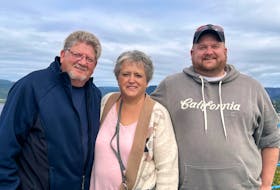CORNER BROOK, N.L. — Many members of municipal councils in western Newfoundland are some of the community's most visible volunteers. Other times, their reach in the community goes far beyond the council table. So, when navigating through council business, just how tricky is it to deal with conflict of interest? Journalist Diane Crocker takes an in-depth look in this feature series.
Corner Brook Mayor Jim Parsons was only a couple of months into his term of office when he asked his council to determine if he was in a conflict interest on a rezoning request for Barry Place.
An individual associated with the rezoning request had contributed to his campaign.
Council decided Parsons was in a conflict and he abstained from discussion and voting on the item.
City council is governed by the City of Corner Brook Act, which has clauses on conflict of interest, but much like the regulations contained in the Municipalities Act it’s not always easy to determine if an individual is in conflict or not.
“The reason I asked for council to decide was because it isn’t cut and dry in terms of campaign donations. It’s somewhat ambiguous,” said Parsons. “There’s the old idea that if you’re not sure if you’re in conflict submit it to council, and then if council says you’re not in conflict, you’re safe. Now if you don’t disclose and it comes to find out after, you could be in trouble.”
Parsons said disclosure is important and the city takes measures to be transparent, which includes having councillors fill out campaign contribution forms after the election and posting them online.
Parsons said the regulations on conflict in the Municipalities Act are also a bit ambiguous when it comes to the relationships and monetary gain. He said if the relation is a person’s brother, mother or father, they are in conflict, but if it’s a second cousin they’re not.
He said his council has asked for examples, case law on conflicts, which can help guide them a bit.
“The only way for a councillor to be completely sure that they’re not on the wrong side of this is to ask council for their determination.
“When in doubt, conflict it out.”
But he added that declaring conflict can’t be used as a way to abdicate a councillor’s responsibility to vote.
Ask for advice
As a relative newcomer to municipal politics, Terry Randell often looks to the veterans around the council table for advice and guidance.
Such was the case during a fall Pasadena council meeting.
On the agenda was the approval of some payments the town had to make, including one to the Pasadena Strawberry Festival.
Randell, who serves as the town’s deputy mayor, has been a volunteer with the festival committee far longer than he's been on council.
He hadn’t sat on the executive over the past year, so going into the meeting Randell didn’t think he was in a conflict of interest.
“A lot of the times with the conflict of interest it comes down to perception,” he said.
Randell decided to let the council decide if he was in a conflict position and left the meeting.
A vote was held, with the remaining six members deciding he wasn’t. Council then approved accounts payable for a number of cheques, including the one to the festival.
“Whatever the transaction was, there was no benefit for me there," he said. "Where I had sat on that committee I wanted to ensure that everyone is aware to make sure that I wasn’t in conflict.”
Randell said by asking his council to decide, he was fully prepared to accept their decision.
Randell is involved in a lot of committees in the town and this was not the first time he inquired about being in conflict.
He’s an executive member of the Pasadena Lions Club and has declared conflict when items about the club came up. He’s also declared conflict for personal reasons, like when a permit he had applied for came up for approval.
Looking at the legislation on conflict of interest, Randell said it’s pretty clear, but there are times when a little clarity may be needed.
“While I’ve been on (council) a year and bit, I’m still a bit of a green thumb," he said. "It’s still very much a learning process for me.”
The Municipal Council Handbook, 2017 Interim Edition states that to be in a conflict of interest, a councillor must have an individual or specific interest in the matter distinct from the interest arising from council function and distinct from an interest held in common with other citizens.
It includes a few examples:
1) A developer is proposing a subdivision. The land involved is owned by, or adjacent to (which may provide a road access, or will potentially affect the value of undeveloped lands) someone on council. This member of council would be in conflict and cannot vote on any aspect of the subdivision proposal or approval processes.
2) Bids on a tender are received and the low bid and recommended company for the job is owned by a close relative of a councillor (sister, son, father, etc.) That councillor should sit out of the vote and/or recommendation process.
3) A donation request is received from a sports team travelling out of the province and a team member is a son or daughter of a council member. That council member should sit out of the voting process.
Randell says he will look to fellow councillors like Gemma Walsh and Derrick Anthony and Mayor Gary Bishop, who he says are a wealth of knowledge.
He’ll also look to staff for answers and if council should get to a spot that it can’t decide, Randell said, they would look to the province for clarification.
There are changes coming to the legislation around conflict of interest in the Municipalities Act, and Randell said it would be hard to crack down on the interpretation because then it would make it too restrictive or too non-restrictive.
“Everyone’s personal circumstances are different and no matter what they might write there it could make it potentially awkward.”
He said there could be more on volunteer activities and what they mean for councillors.
“I don’t think the legislation is terrible. Anything can be improved.”
Municipalities Act
Conflict of interest
207. (1) A councillor shall not vote on or speak to a matter before the council or a committee of the council where
(a) the councillor has a monetary interest in the matter distinct from an interest arising from his or her functions as a councillor;
(b) the councillor has a monetary interest directly or indirectly in the matter;
(c) a relative of the councillor has a monetary interest in the matter; or
(d) the councillor is an officer, employee or agent of an incorporated or unincorporated company, or other association of persons, that has a monetary interest in the matter.
(2) For the purpose of subsection (1) a relative of a councillor means a father, mother, spouse, cohabiting partner, sister, brother, child, step-child, ward, mother-in-law, father-in-law, sister-in-law, or brother-in-law of the councillor.
(3) For the purpose of subsection (2)
(a) "cohabiting partner" means a person with whom a councillor is living in a conjugal relationship outside marriage; and
(b) "spouse" means a person to whom a councillor is married, unless the person and the councillor have made a separation agreement or their support obligations and family property have been dealt with by a court order.
(4) In order for an interest to be considered as one falling within the prohibition set out in subsection (1) it shall be an interest distinct from an interest held in common with the other citizens or classes of citizens of the municipality.
Disclosure
208. (1) Where a councillor has an interest described in subsection 207(1), the councillor shall
(a) state that he or she has that interest; and
(b) state the nature of the interest at the beginning of discussion on the matter in which he or she has that interest,
and that statement respecting his or her interest shall be recorded in the minutes of the council, or a committee of the council, where that statement was made at a committee meeting.
(2) Where a councillor declaring a conflict of interest under subsection (1) is the presiding officer, he or she shall vacate the chair.
(3) Where a councillor declares a conflict of interest under subsection (1) he or she shall immediately leave the meeting while the matter on which he or she has a conflict of interest is being discussed.
(4) Where one or more councillors have declared a conflict of interest under subsection (1) and there is no longer a quorum to vote on a matter, the minister may direct that the remaining councillors make a decision on the matter as if those remaining councillors constituted a quorum.
(5) Where all councillors have declared a conflict of interest under subsection (1), the minister may require that an official of his or her department prepare a report respecting the matter and where the report indicates that the councillors should proceed with making a decision, the minister may exempt the council from the application of section 207, and the councillors may vote on the matter.
Decision of council
209. (1) Where a councillor is in doubt as to whether or not he or she has a monetary interest that is a conflict of interest under section 207, he or she shall make a disclosure and the council may decide the question by majority vote and its decision on the matter is final.
(2) A councillor whose possible conflict of interest is being voted on is not entitled to vote.
Disclosure statement
210. (1) The councillors, clerk, manager, treasurer and department heads of a municipality, shall complete annually, a disclosure statement in a form which the council may establish setting out the interest of a councillor or an employee that may place him or her in a conflict of interest.
(2) A disclosure statement completed under subsection (1) shall list
(a) real property or an interest in real property within the municipality that is owned by the councillor or employee;
(b) corporations in which the councillor or employee holds 10% or more shares;
(c) partnerships and sole proprietorships in which the councillor or employee holds a 10% or more interest; and
(d) businesses located within the municipality that are owned by the councillor or employee.
(3) A disclosure statement required under subsection (1) shall be filed with the council by
(a) a councillor, not more than 60 days after taking office immediately after his or her election or appointment and not later than March 1 in each subsequent year; and
(b) the clerk, manager, treasurer and department heads, not more than 60 days after commencing employment with the council and not later than March 1 in each subsequent year.
(4) Notwithstanding subsection (3), a change in the information contained in a disclosure statement filed under that subsection shall be reported to the council, in writing, by a councillor, clerk, manager, treasurer or department head not more than 60 days after that change occurs.
(5) A disclosure statement filed under this section shall be retained by the clerk and reviewed at a privileged meeting of the council not more than 30 days after the date required for filing under subsections (3) and (4).
City of Corner Brook Act
Conflict of interest
22. A councillor shall not vote on or speak to a matter before the council or a committee of the council where the councillor
(a) has an interest in the matter distinct from an interest arising from his or her functions as a councillor;
(b) has a monetary interest directly or indirectly in that matter; or
(c) is an officer, employee or agent of an incorporated or unincorporated company, or other association of persons, that has a monetary interest in that matter.
Interpretation
23. In order for an interest to be considered as one falling within the prohibition set out in section 22 it must be an interest separate and distinct from an interest held in common with the other citizens of the city or a class of citizens.
Disclosure
24. (1) Where a councillor has an interest as set out in section 22, the councillor shall so state and shall state the nature of that interest at the beginning of discussion on the matter in which the councillor has an interest.
(2) Where the councillor declaring a conflict of interest under subsection (1) is the presiding officer, that councillor shall vacate the chair.
(3) Where the councillor declaring a conflict of interest under subsection (1) does so at a privileged meeting, the councillor shall leave that meeting while the matter is being discussed.
(4) Where one or more councillors have declared a conflict of interest under subsection (1) and there is no longer a quorum to vote on a matter, the minister may direct that the remaining councillors make a decision on the matter as if those remaining councillors constituted a quorum.
(5) Where all councillors have declared a conflict of interest under subsection (1), the minister may require that an official of his or her department prepare a report respecting the matter and where the report indicates that the councillors should proceed with making a decision, the minister may exempt the council from the application of section 22, and the councillors may vote on the matter.
Decision of council
25. (1) Where a councillor is in doubt as to whether there is a conflict of interest under section 22, he or she shall make a disclosure and the council may decide the question by majority vote and its decision on the matter is final.
(2) A councillor who makes a disclosure under subsection (1) shall not be considered a councillor for purposes of determining the majority vote.
Disclosure statement
26. (1) The council may provide that its councillors and those of its employees that it may designate complete a disclosure statement in a form prescribed by the council setting out, in the manner that the council prescribes, the interest of a councillor and employee that may place that person in a conflict of interest.
(2) The council may provide that disclosure statements filed under subsection (1) by the councillors be made available for public access.









